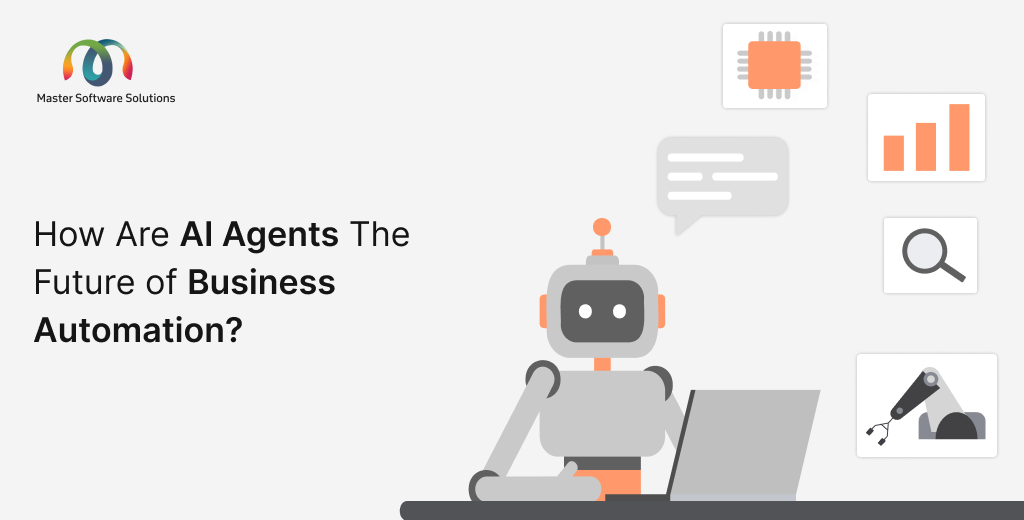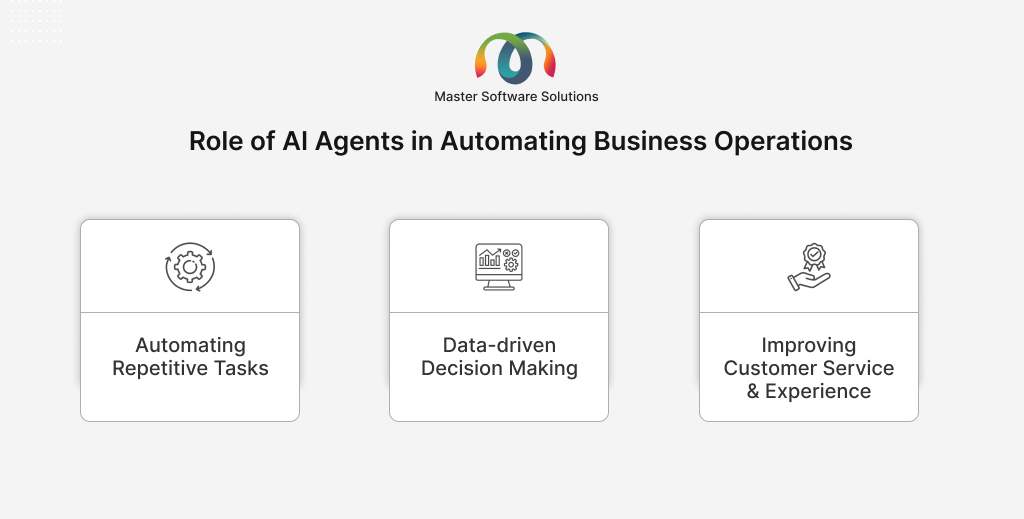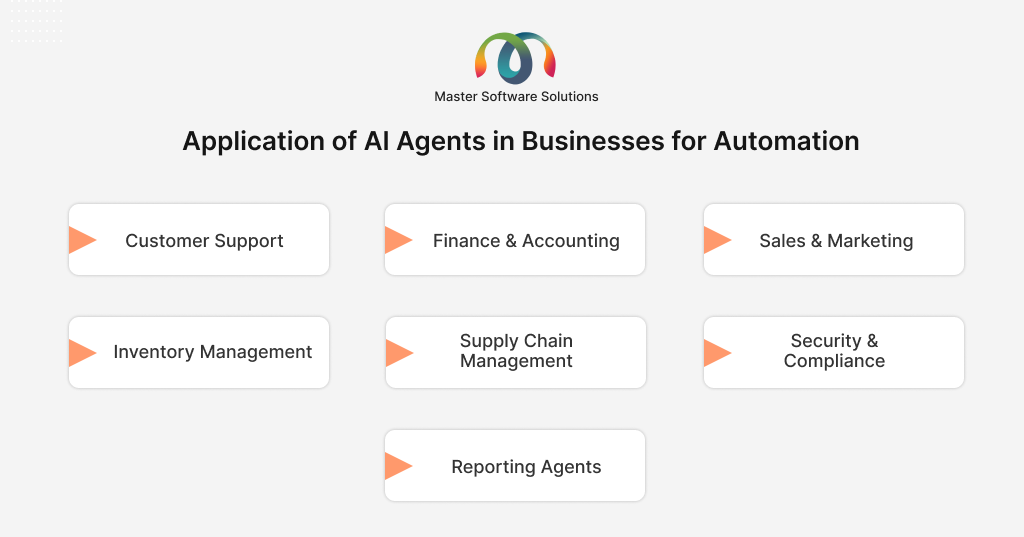Artificial intelligence (AI), powered by machine learning and deep learning, has revolutionized the business scope. Automation is no longer limited to data entry but has expanded to autonomous operations.
This blog explores how AI agents have become the future of business automation and about autonomous automation in business operations.
Note* Autonomous automation is associated with artificial intelligence and cognitive computing in combination with Robotic Process Automation (RPA).
What are AI agents? Definition, features, and working
AI agents are software programs or devices that use artificial intelligence to perceive and interact with the environment, collect and process data, and take actions independently to achieve a specific objective. The components of an AI agent are:
- Sensors
- Actuators
- Perception module
- Decision-making
- Cognitive architecture
- Learning or knowledge-based systems
The AI agents work on predefined rules, learned patterns, or adaptive algorithms. The types of AI agents can range from simple reflex agents to sophisticated agents. These sophisticated agents are fully autonomous and can execute complex workflows from start to end.
Features of AI agents
AI agents are known for their ability to operate autonomously, respond to the environment, and potentially learn and adapt. The agents are designed and developed to achieve specific objectives and goals. The key features of AI agents are:
- Autonomy – AI agents can operate and make decisions with minimal human intervention.
- Reactivity – They can analyze their environment and respond to its changes to achieve their goals.
- Goal-orientation – AI agents are designed to achieve objectives predefined or learned through interactions.
- Learning abilities – The agents can learn through machine learning techniques, past interactions, and experiences.
How do AI agents work?
AI agents perceive their environment, process gathered information, make decisions, and execute actions to achieve specific goals. They can operate autonomously to collect data, analyze it using machine learning techniques, and interact with the environment to complete a task. Process involved in the working of AI agents:
- Perceiving the environment – AI agents receive input from various sources, including user interactions, sensor data, and system data.
- Information processing – The information collected from the environment is processed using AI techniques such as machine learning, natural language processing, and reasoning algorithms.
- Decision-making – The AI agent decides what to do next based on analysis. This is done using models like sentiment analysis and classification algorithms.
- Executing actions – They use actuators or other output mechanisms to help you take action upon the decision made. This involves interacting with external systems, tools, or users.
- Learning and adaptation – Advanced AI agents have learning capabilities and can adapt to a changing environment. They can adjust and improve their performance over time.
Role of AI agents in automating business operations
AI agents can automate various business operations, including repetitive tasks, making data-driven decisions, and enhancing customer service to improve efficiency and reduce costs. They can be integrated with business departments, including customer support, finance and accounting, sales and marketing, inventory management, and more. The roles of AI agents in business operations are:
Automating repetitive tasks
AI agents can automate repeating, rule-based tasks that are generally time-consuming. Automating these tasks can help you improve business efficiency and productivity, mitigate human errors, save costs, and boost employee morale. AI agents can automate tasks, including;
- Data entry and processing
- Scheduling and coordination
- Automated communication
- Content management
Data-driven decision making
AI agents are powerful tools that can analyze large datasets and extract meaningful insights, making more informed decisions. These AI agents can help make more accurate and reliable decisions, enhance strategic planning, optimize resource allocation, and offer a competitive advantage. Ways AI agents help make data-driven decisions are:
- Real-time data analysis
- Predictive analysis
- Personalized insights
- Reporting and visualization
- Scenario planning and simulation
Improving customer service and experience
The AI agents are transforming customer interaction, enhancing service, and creating more positive experiences. They can help you increase customer satisfaction, improve customer loyalty, reduce customer service costs, and empower your human agents. Ways AI agents help improve customer service and experience are:
- 24/7 availability and instant support
- Personalized interaction
- Efficient issue resolution
- Omnichannel support
- Sentiment analysis
- Proactive support
Types of AI agents used in enterprises
Various types of AI agents are integrated with business operations for autonomous automation. Here, we’ll discuss the typically used AI agents in enterprises.
Conversational agents
They are designed to simulate human-like conversations with users via voice or text interfaces. These agents use NLP and ML to understand user intent, answer questions, provide information, and perform simple tasks. The conversational AI agents are used in customer support, employee support, sales and marketing, and internal communication.
Task automation agents
These AI agents focus on automating repetitive, rule-based tasks defined by humans. They interact with other systems and data sources to execute tasks efficiently and accurately. Task automation AI agents are implemented in data entry and processing, invoice processing, report generation, workflow automation, and IT support.
Intelligent process agents
The intelligent process AI agents can understand the context of business processes and make smart decisions. They analyze data, learn from experience, and adapt their action for optimized processes. These smart AI agents are used in supply chain optimization, fraud detection, risk management, personalized experience, and dynamic pricing.
Autonomous agents
Autonomous AI agents can operate independently and make decisions without human interference. They perceive the environment, define objectives, plan actions, execute them, and learn from the outcome to improve future performance. These autonomous agents are implemented in complex problem solving, robotics and automation, financial trading, cybersecurity, and research and development.
Application of AI agents in businesses for automation
AI agents can help you automate various business operations, improve efficiency, reduce costs associated with handling repetitive tasks and making data-driven decisions, and enhance customer service. The applications of AI agents for autonomous business automation are:
Customer support
AI-powered chatbots and virtual assistants provide 24/7 customer service. They can answer frequently asked questions and even resolve issues without human intervention. This reduced the issue resolution time, enhancing efficiency and customer satisfaction.
Finance and accounting
Agents can automate repetitive tasks, including data entry, invoice processing, reconciliation, and fraud detection. They can identify fraudulent activities, generate financial reports, forecast business financials, and assess risks. This saves time and provides meaningful insights for better financial decisions.
Sales and marketing
AI agents automate lead generation and nurturing campaigns and personalize customer interactions. They can analyze customer data to identify patterns, predict customer behavior, and suggest the right product or service. Agents can also automate social media engagement, content creation, and campaign optimization.
Inventory management
Integrating AI agents into your inventory system can help you predict demand, track real-time stock levels, and automate reordering. AI agents can analyze historical data, seasonality, and market trends for accurate forecasting. They can help prevent stockouts and overstocking, leading to cost savings and improving supply chain efficiency.
Supply chain management
AI agents can optimize logistics, predict potential disruptions, and automate communication between your stakeholders, enhancing supply chain management. They can analyze large datasets to identify bottlenecks, optimize transportation routes, and assess supplier risks, making the supply chain more resilient and efficient.
Security and compliance
Agents can monitor network activity in real-time to detect and respond to potential cyber threats, automate security patching, and assist with regulatory compliance. Agents imply a proactive approach to strengthen businesses’ defenses to reduce the chances of breaches or penalties.
Reporting agents
AI-powered reporting agents automate data collection, analysis, and report generation. AI agents can fetch data from various resources, identify trends and insights, and create customized reports on demand. This reduces manual efforts and provides timely information for prompt decision-making.
Conclusion
Integrating AI agents into your business operations can help you enhance efficiency, productivity, and profitability. They can simplify processes, mitigate chances of errors, and forecast trends, improving the business’s resilience. Investing in such technology might seem to dig a hole in your pockets; however, it can be a well-planned strategy to enhance your business operations.
If you want to build a custom AI agent or buy from turnkey AI agent solutions, schedule a meeting, and our team will contact you shortly.


